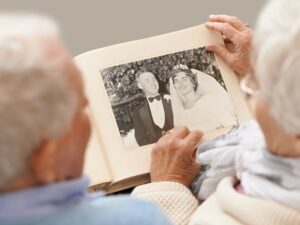A monthly article brought to you by Senior Services Memory Support Programs
 As an individual’s dementia progresses, some people may stop recognizing people they know, even close family members. This can be upsetting for families as well as the person themselves. Attempts to remind the person who the people in front of them are, can be confusing and frustrating for them.
As an individual’s dementia progresses, some people may stop recognizing people they know, even close family members. This can be upsetting for families as well as the person themselves. Attempts to remind the person who the people in front of them are, can be confusing and frustrating for them.
It’s still important to keep these connections with the person with dementia, and to include and involve them wherever possible. Familiarity and support from the people who know them best will help them feel safe and comfortable; and occasional moments of recognition can make it all worthwhile.
Difficulty with recognizing familiar people does not happen in all types of dementia; it’s more common in Alzheimer’s disease for instance, and rarer in vascular dementia.
For some people with dementia, the gradual loss of recent memories means the person may still remember you, but they may expect to see a younger person in front of them. In others, the part of the brain that is responsible for recognizing faces can become damaged. This is referred to as prosopagnosia. If the person diagnosed with dementia is failing to recognize you or others for the first time, or seems distressed in your company, it’s worth checking that there isn’t another reason for this, such as infection, medication changes, constipation etc.
Some people with dementia appear to ‘travel back in time’, reliving memories from when they were younger. They might expect grown up children to be small again, or expect their parents to still be alive, or even revert back in their mind to previous marriages or relationships.
There are cues you can use to help the person with dementia make the connections between the past and the present. The following tips may help to do this:
- Put up photos around the house of important times you were together, such as weddings, birthdays, children’s parties
- Show the progression of time in these photos, so that they show a spouse or partner when young, but also throughout time and how they appear now
- Keep a photo album on display with the photos clearly marked with people’s names, the year and the event, following the progression from the past to the present day
- Wear clothes around the house that the person would associate with you; these could include a favorite item of clothing or styles from when you were both younger
- Wear aftershave or perfume that the person associates with you. If they have a favorite perfume or aftershave, encourage its use; often the sense of smell can evoke positive memories when words cannot
It can be very difficult when someone with dementia stops recognizing you, but there are things you can do to keep your connection with the person, and your relationship with them warm and open.
If you can, try ‘entering into their world’, and asking the person living with dementia about the memories they mention. Encouraging them to talk about what feels familiar will help them to feel at ease. Try not to remind the person with dementia of more recent realities that they’re having trouble grasping, such as the death of their parents, as this can cause distress and confusion. Instead, talk about happy memories and events that are important to them. Taking part in activities together can be a good way to reconnect with a person with dementia. Anything you both enjoy can help you feel closer, such as:
- Playing some familiar music
- Watching a favorite film
- Drawing pictures
- Going for a walk and talking about the things you see on the way
- Flower arranging
- Doing a jigsaw puzzle, if possible
While taking part in these activities, the following communication methods may be beneficial.
- Keep yourself in the person’s eyeline, and try not to suddenly appear from the side or from behind
- Speak clearly and in short sentences
- If the person is struggling to recognize you, introduce yourself and tell them about the connection between you, for instance: “Hello mum, it’s Julie and I have little Danny, your grandson with me.”
- Be reassuring; look the person in the eye and smile
- If a person with dementia is getting agitated, take yourself to another room for a few minutes before coming back in, calmly, and saying something like: “Hello, I’m back now, how lovely to see you.”
- Try not to correct the person if they get your name wrong or say something that isn’t true; this can lead to distress and frustration on all sides. Try to imagine how the person with dementia is feeling
When you start to notice memory changes, seeking early detection is key. Senior Services offers an array of memory support programs including confidential memory screenings to obtain a cognitive baseline, consultations and educational classes along with support from Seasons Adult Day Health Services. If you or someone you know is experiencing increasing changes with their memory and could benefit from additional services, please contact Amy Sheridan, Family Support and Activity Manager at 989-633-3764.
Check out our section, Our Mind Matters, next month as we discuss activities.

